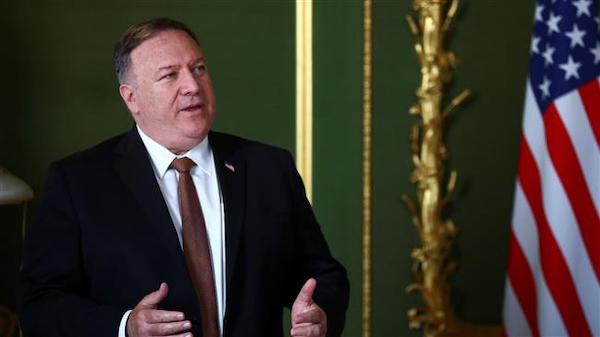
US Secretary of State Mike Pompeo speaks during a meeting with British Foreign Secretary Dominic Raab (not pictured), at Lancaster House in London, Britain, on July 21, 2020. (Photo by Reuters)
US Secretary of State Mike Pompeo has repeated a widely-disregarded call for the extension of an arms embargo on Iran that is due to expire in a matter of months under an international deal with Tehran, even though a US attempt at the United Nations (UN) to have that embargo extended is most likely to fail.
At a joint press conference with British Foreign Secretary Dominic Raab in London on Tuesday, Pompeo said the two had discussed the "importance" of extending the arms embargo, which is due to expire in October.
The administration of US President Donald Trump has been attempting what it has called a "maximum pressure" campaign against Iran since 2018, when Washington pulled out of the Iran nuclear deal.
The embargo, a remnant of the Western dispute with Iran over its nuclear program, is due to be lifted in October under the deal, which brought the dispute in its original form to an end in 2015. The United States, whose unilateral withdrawal from the Iran deal faced strong backlash from much of the international community, has been attempting to have the embargo extended. It has submitted a draft resolution to that effect to the UN Security Council, but has faced strong opposition from Russia and China and ambivalence from its own European allies.
To circumvent possible vetoes by Russia and China, the US plans to make the bizarre case that it legally remains a "participant state" to the nuclear deal and can thus invoke a mechanism in it to snap UN sanctions on Iran back into place.
In late June, Pompeo faced a sharp reprimand from world powers, including its allies, over that argument.
Iran has made it clear that the US is no more a party to the deal. So have Russia, China, and the EU.
The nuclear agreement, officially known as the Joint Comprehensive Plan of Action (JCPOA), was reached between Iran and what was then called the P5+1 group of countries - namely the US, Britain, France, Russia, China, and Germany.
Trump had long attacked the deal - which he saw as a legacy of former US President Barack Obama - before he withdrew America from it in 2018.
SOURCE: PRESS TV
LINK: https://www.ansarpress.com/english/19517
TAGS:






























 online news tv
online news tv




